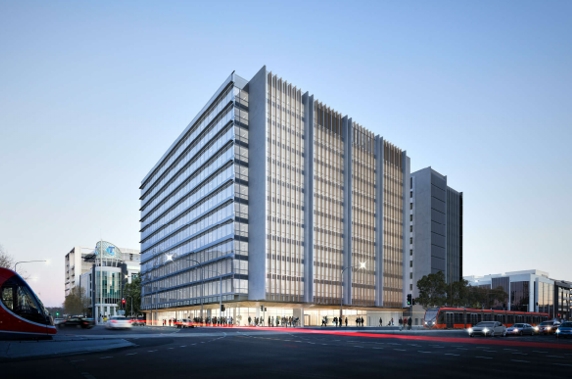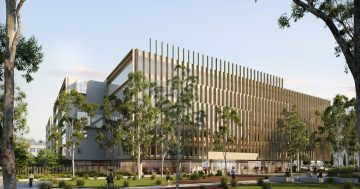
CQ2 in the CBD will be the Department of Agriculture, Water and the Environment’s new headquarters. Image: Amalgamated Property Group.
Friction at one of the federal government’s major departments over a flexible seating plan highlights some of the challenges in adjusting to the new ways of working that have been accelerated by the COVID-19 pandemic.
The Department of Agriculture Water and Environment’s pilot plan for flexible seating arrangements and a booking system in combination with its flexible working policy has met resistance from staff, who say they first heard about it from the Public Sector Union.
The CPSU said that a survey of staff showed that the vast majority of respondents are very concerned about this arrangement referred to as hot desking.
It said 95 per cent of respondents did not agree with, or are unsure about, the introduction of the proposed seating and booking system in which staff would not have their own desk but have to book a workstation.
Just over 70 per cent of those surveyed did not believe their feedback would be considered during the rollout.
“The Department of Agriculture, Water and Environment have tried to creep in hot desking under the cover of a lockdown, without any consultation with their staff,” CPSU National Deputy President Brooke Muscat said.
“Canberra has just come out of an extended lockdown and the department refuses to even consult on a policy that puts its workforce’s workplace health and safety at risk. Now is absolutely not the time to implement policies like this – there are complex WHS issues to work through first as staff return to offices.”
She said members had said they were disappointed by the lack of consultation and scared of the implications while still mid-pandemic.

CPSU National Deputy President Brooke Muscat: DAWE has tried to creep in hot desking under the cover of a lockdown. Photo: CPSU.
A Department spokesperson denied it was introducing hot desking and said its flexible seating arrangements would provide staff with more choice and individual control about how and where they work.
“It creates an opportunity for staff to use spaces differently to support the way they are actually working and will allow the department to use its resources more efficiently,” the spokesperson said.
DAWE, the spokesperson said, was consulting extensively with staff in accordance with the department’s Enterprise Agreement and has included the CPSU.
My Public Sector
The new arrangements also reflected the workforce’s changing expectations of new ways of working by removing the traditional emphasis on location, the spokesperson said.
“Aligned with our flexible working policy, these arrangements enable staff to work within departmental buildings or virtually, meaning that people will not need a desk in the office every day,” the spokespersons said.
“Flexible seating practices are already in place in a number of APS agencies and we are taking their lessons learnt into account in planning our pilot.”
All arrangements would comply with SafeWork Australia protocols for providing a COVID-19 safe work environment for staff and appropriate arrangements would be made for staff with WHS equipment and other adjustments.
The DAWE pilot is similar to arrangements in the new ACT Government buildings that operate at about 80 per cent capacity, with a number of staff working from home for at least some of the week.
The new offices accommodate about 3000 staff, but has only 2500 workstations as part of the adoption of activity-based working which allocates eight workstations for every 10 staff, presuming that at any time on any given day, a proportion of the workforce will not be in the office.
Staff, many of whom may be working some of the time from home, are not allocated workstations except where there is a clear need identified and need to book a desk.
The government is paying a company $700,000 to implement a digital wayfinding system that will allow staff to manage desk and room bookings as well as provide data on how the buildings are being used.
DAWE is paying almost $850,000 for a range of services to do with the pilot.
Many government agencies are moving to this hybrid model and adjusting their floorplans, fitouts and staff management policies.
The DAWE pilot is in preparation for Canberra staff moving into a new building in the Canberra CBD next year – Civic Quarter 2 or CQ2 – being developed by Amalgamated Property Group.
The spokesperson said the move from the Marcus Clarke Street and London Circuit buildings to CQ2 on the corner of Northbourne Avenue and Cooyong Street would likely take place in the third quarter of 2022.


















